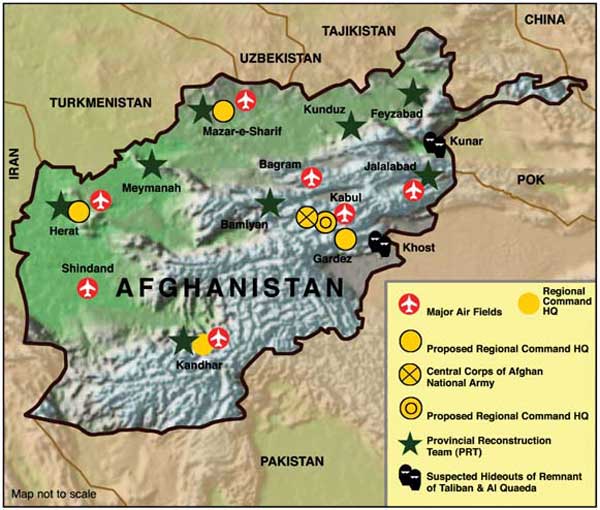IDR Blog
Afghanistan and India 2020 Emerging Perspectives

Afghanistan in 2020 is at critical crossroads arising from uncertainties in wake of US-Taliban Doha Accords impelled by US political expediencies. However, one glimmering certainty is India’s continuing commitment to Afghanistan’s secure and stable future.
India’s principled stand on the Afghanistan Peace Dialogues has borne fruit in that India always maintained that any Peace Dialogue determinations could not be impelled by political expediencies of the United States, Pakistan or Taliban, and certainly not China as the strategic patron of Pakistan.
India stoutly maintained all along that sustainable peace, security and stability of Afghanistan could only be achieved by an “Afghan-led, Afghanistan-Owned and Afghanistan Controlled Peace Process”.
Till September 2020 this was a major impediment with the Afghanistan Government unyielding on the above principle and the Taliban refusing to deal with the duly-elected Kabul Government representing the will of the Afghan people.
That this stands achieved and validated is manifested by the recent three-day visit of Dr Abdullah Abdullah who can be said that he co-shares political power with Afghanistan President Abdul Ghani and now is designated as Afghanistan’s Chairman of the High Commission for National Reconciliation with the lead role in Intra-Afghan Talks at Doha.
Dr Abdullah Abdullah visited New Delhi heading a sizeable delegation of Afghanistan political leaders and Officials. They had detailed discussions with India’s National Security Adviser, India’s Foreign Minister and met PM Modi also.
The three day meet discussed the Afghanistan Peace Process and the Intra-Afghan Talks in Doha. India reiterated that any Peace Settlement “Acceptable to Afghan People” was acceptable to India.
Responding to changed parameters giving primacy to Intra-Afghan Talks, India for the first time attended the new round of Doha Talks as an Observer and addressed the gathering including the Taliban.
Afghanistan conceded and asserted the significance of Afghanistan-India ties by stating that “India is a strategic partner of Afghanistan and has continuously supported the Government and Peoples of Afghanistan. Our historical relations with India are very important to us and the role of India in establishing lasting peace in Afghanistan and the region”.
My past writings on Afghanistan have stressed that India has legitimate security interests and stakes in Afghanistan which also were contributory to India’s massive economic aid for war-ravaged reconstruction of Afghanistan.
India’s stakes in Afghanistan in 2020 are that much more accentuated when the uncertainties that hover Afghanistan’s security environment primarily centred on (1) Afghan Taliban’s enduring commitment to “Honour” all pledges given to United States at Doha (2) Pakistan’s propensities to re-start “Disruptive Strategies” in Afghanistan via the Taliban should it emerge in power-sharing role in Kabul (3) United States resolve for yet another US military intervention in Afghanistan should Taliban-Pakistan Nexus emerge as a born-again hydra-headed monster to destabilise Afghanistan and make it subservient to Pakistan Army strategic ends.(5) Major impediments to National Reconciliation by Taliban-imposed terms may result in break-off of talks and renewed Taliban violence?
That security of Afghanistan in 2020 is significantly critical for India’s national interests stood manifested that for the first time in TV visuals of Group Photograph at the Hyderabad House Talks, one could see India’s Chief of Defence Staff, General Bipin Rawat flanking Dr Abdullah Abdullah along with India’s National Security Adviser, Ajit Doval.
It is high time for India’s political leadership to recognise that diplomacy can longer be the ‘exclusivist domain’ of Indian diplomats when diplomacy has acquired inseparable intertwining with security and military determinations of India’s foreign policy formulations. This more significantly applies to India’s policy approaches towards India’s inveterate enemies—Pakistan and China.
Analytically, it would be fair to assume that Dr Abdullah visited New Delhi after a round of visits to Pakistan including calls on Pakistan Army Chief General Bajwa would have shared Pakistan’s perceptions and Pakistan’s attitudinal inclinations towards the Intra-Afghan Talks.
In terms of emerging perspectives in 2020 on Afghanistan’s unfolding political and military environment there are some ‘constants’ and ‘many variables.’
“Constants” that will continue to hover over Afghanistan’s security and stability post-2020 are decidedly Pakistan-Centric, Taliban –Centric and China Centric. All three will not dispense with their propensities to oust India from its privileged standing in Afghan Government’s policy formulations.
“Many Variables” spin around unfolding United States post-2020 Afghanistan policy formulations determined by who emerges as the next US President? Also since Afghanistan will not witness complete US military withdrawals by Christmas 2020 and with pressures of US Presidential Elections off, could Afghanistan witness a fresh ‘Surge’ of US Troops to forestall any Taliban mischief and enhanced suicide bombings by Taliban.
Another ‘variable’ that needs consideration will be Russia’s policy attitudes on Afghanistan that has seen many changes in the last decade. Regular readers of my Papers on Afghanistan would recall as to how Russia under China’s influence was flirting around with the –Pakistan-China-Russia Trilateral on Afghanistan and side-lining India. Russia belatedly realised the futility of this approach and one sees a visible change.
Concluding, it needs to be stressed that India while steadfastly adhering to its principled foreign policy on Afghanistan, India cannot wish away the minefields that dot its policy implementation on Afghanistan by the “Constants” and “Variables” outlined above. The challenges so generated by such a minefield will be more “Security & Military” in content than “Political & Diplomatic” India as an aspirational Major Power cannot wish away that India would be expected to assert itself even militarily, if need be, in conjunction with US/UN efforts to safeguard Afghanistan’s security and security.




